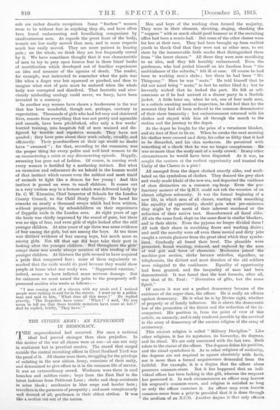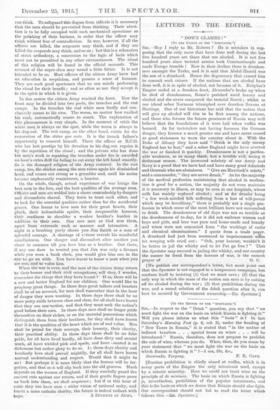THE CITIZEN ARMY : AN EXPERIMENT IN DEMOCRACY.
THE unprecedented had occurred. For once a national I ideal had proved stronger than class prejudice. In this matter of the war all classes were at one—at one not only in sentiment but in practical resolve. The crowd that surged outside the central recruiting offices in Great Scotland Yard was the proof of it. All classes were there, struggling for the privilege of enlisting in the new citizen Army, conscious of their unity, and determined to give effect to it in the common life of service. It was an extraordinary crowd. Workmen were there in cord breeches and subfuse coats ; boys from the East End in the latest fashions from Petticoat Lane ; clerks and shop-assistants in sober blank ; mechanics in blue serge and bowler hats ; travellers in the garments of prosperity ; and most conspicuously well dressed of all, gentlemen in their oldest clothes. It was like a section cut out of the nation. Men and boys of the working class formed the majority. They were in their element, shouting, singing, checking the " coppers " with as much ribald good humour as if the recruiting office had been a music-hall. But some of the other classes were far less at their ease. They had been brought up from earliest youth to thank God that they were not as other men, to set store by the innumerable little marks that distinguished them from " the lower classes." All these they were now sacrificing to an idea, and they felt horribly embarrassed. Even the gentleman, who had prided himself on his freedom from " the snobbishness of the suburbs," felt ill at ease. Of course he had been to working men's clubs ; but there he had been " Mr.
Thingumy." Here he was " mate." He told himself that he did not mind being " mate," in fact he rather liked it ; but he fervently wished that he looked the part. He felt as self- conscious as if he had arrived at a dinner party in a Norfolk jacket. A little later on, when he sat, one of four nude men, in a cubicle awaiting medical inspection, he did feel that for the moment they had all been reduced to the common denominator of their sheer humanity ; but embarrassment returned with his clothes and stayed with him all through the march to the station and the journey to the depot.
At the depot he fought for the prize of a verminous blanket, and six foot of floor to lie on. When he awoke the next morning his clothes were creased and dirty, his collar so filthy that it had to be discarded, and his chin unshaven. He perceived with something of a shook that he was no longer conspicuous. He
was no more than the seedy unit of a seedy crowd. In any other circumstances he would have been disgusted. As it was, he sought the canteen at the earliest opportunity and toasted the Unity of the Classes in a pint 1
All emerged from the depot clothed exactly alike, and medi- tated on the symbolism of clothes. They donned the grey shirt and ready-made khaki of the new era, and deposited the emblems of class distinction on a common rag-heap. Even the psr- funotory manner of the Q.M.S. could not rob the occasion of an
almost religious solemnity. It was the formal beginning of a
new life, in which men of all classes, starting with something like equality of opportunity, should gain what pre-eminence they might by the merit of their inherent manhood or the seduction of their native tact. Henceforward all fared alike. All ate the same food, slept on the same floor in similar blankets, and in their shirts. Even the pyjama no longer divided them !
All took their share in scrubbing floors and washing dixies ; and until the novelty wore off even these menial and dirty jobs caught a certain glamour from the great ideal which they symbo- lized. Gradually all found their level. The plausible were promoted, found wanting, reduced, and replaced by the men of real grit and force of character. Mechanics joined the
machine-gun section, clerks became orderlies, signallers, or telephonists, the dirtiest and most drunken of the old soldiers were relegated to the cookhouse. Equality of opportunity had been granted, and the inequality of man had been demonstrated. It was found that the best formula, after all, was that of St. Paul : " Diversities of gifts, but the same Spirit."
Of course it was not a perfect democracy because of the existence of the super-class, the officer. He is really an offence
against democracy. He is what he is by Divine right, whether of property or of family influence. He is above the democratio law of the promotion of the fittest and the reduction of the in- competent. His position is, from the point of view of this article, an anomaly, and is only rendered possible by the survival in the army of democracy of the ancient religion of the army of aristocracy.
This ancient religion is called " Military Discipline." Like other religions, it has its mysteries, its hierarchy, its dogmas, and its ritual. We are only concerned with the last two. Both relate to the status of the officer. The dogmas define his position,
and the ritual symbolizes it. As in other religions of authority, the dogmas are not required to square absolutely with facts, nor is more than a formal acquiescence demanded from the faithful. For example, it is a dogma that the officer alone possesses common-sense. But it has happened that an indi-
vidual officer has been lacking in this gift, whereas the sergeant has possessed it. In such circumstances an officer may borrow
his sergeant's common-sense, and religion is satisfied so long as only the officer exercises it. An officer may even borro'w common-sense from a privt I.e provided that it is done through the medium of an N.C.O. Lnother dogma is that only officere •
can think. To safeguard this dogma from ridicule it is necessary that the men should be prevented from thinking. Their atten- tion is to be fully occupied with such mechanical operations as the polishing of their buttons, in order that the officer may think without fear of contradiction. In war, however, if all the officers are killed, the sergeants may think, and if they are killed the corporals may think, and so on ; but this is a relaxation of strict orthodoxy, a concession to the logic of facts which must not be permitted in any other circumstances. The ritual of this religion will be found in the official manuals. This account of the super•olass may sound a little bitter. It is not intended to be so. Most officers of the citizen Army have had an education in scepticism, and possess a sense of humour. They are such good sportsmen that no one minds performing the ritual for their benefit ; and as often as not they accept it in the spirit in which it is given.
In due course the citizen Army reached the front. Now the front may be divided into two parts, the trenches and the rest camps. In the trenches the real white man finally and con- clusively comes to his own. The worm, no matter how exalted his rank, automatically ceases to count. The explanation of this phenomenon is very simple. In the moment of crisis the white man is always on the spot, while the worm is always in his clog-out. The rest camp, on the other hand, exists for the restoration of the status quo ante. It is the trench failure's opportunity to reassert himself. There the officer or N.C.O. who has lost prestige by his devotion to his dug-out regains it by the repetition of the ritual ; and the private who has done ten men's work in repairing the trenches under fire is awarded an hour's extra drill for failing to cut away the left hand smartly. So is the damaged religion of the Army restored. In the rest camp, too, the shirker among the men raises again his diminished head, and comes out strong as a grumbler and, until his mates become unpleasantly reminiscent, a boaster.
On the whole, though, actual experience of war brings the best men to the fore, and the best qualities of the average man. Officers and men are welded into a Closer comradeship by dangers and discomforts shared. They learn to trust each other, and to look for the essential qualities rather than for the accidental graces. One learns to love men for their great hearts, their pluck, their indomitable spirits, their irrepressible humour, their readiness to shoulder a weaker brother's burden in addition to their own. One sees men as God sees them, apart from externals such as manner and intonation. A night in a bombing party shows you Jim Smith as a man of splendid courage. A shortage of rations reveals his wonderful unselfishness. One danger and discomfort after another you share in common till you love him as a brother. Out there, if any one dare to remind you that Jim was only a fireman while you were a bank clerk, you would give him one in the eye to go on with. You have learnt to know a man when you see one, and to value him.
When the war is over, and the men of the citizen Army return to their homes and their civil occupations, will they, I wonder, remember the things that they have learnt ? If so, there will be a new and better England for our children. One would like to prophesy great things. In those days great talkers and boasters shall be of no account, for men shall remember that in the hour of danger they were wanting. In those days there shall be no more petty strife between class and class, for all shall have learnt that they are one 'nation, and that they must seek the nation's good before their own. In those days men shall no longer pride themselves on their riches, or on the material possessions which distinguish them from their brethren, for they shall have learnt that it is the qualities of the heart which are of real value. Men shall be prized for their courage, their honesty, their charity, their practical ability. In those days there shall be no false pride, for all have lived hardly, all have done dirty and menial work, all have wielded pick and spade, and have counted it no dishonour but rather glory to do so. In those days charity and brotherly love shall prevail mightily, for all shall have learnt mutual understanding and respect. Would that it might be so I But perhaps it is more likely that the lessons will be for- gotten, and that man will slip back into the old grooves. Much depends on the women of England. If they carefully guard the ancient ruts against our return, and if their gentle fingers press us back into them, we shall acquiesce ; but if at this hour of crisis they too have seen a wider vision of national unity, and learnt a more catholic charity, the future is indeed radiant with



































 Previous page
Previous page